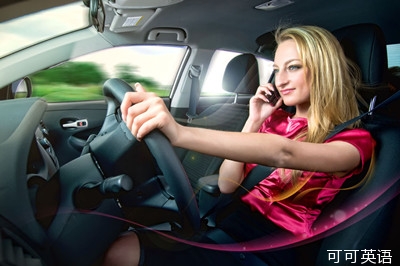(单词翻译:单击)
DON:It's time for a new feature on our show, called I Got the Data.
唐:现在是我们节目的一个新板块,它被称为《我就是有科学依据》。
This is where I say something that a smart-alec at a party would no doubt disagree with, and then I triumph by having data to back it up.
一个自作聪明之人无疑会对我在派对讲的事情持反对观点,然后我通过数据支持获胜。
Yael will play the smart-alec. Ready?
而雅艾尔将扮演那个自作聪明之人。准备好了吗?
YAEL:Ready.
雅艾尔:可以开始了。
DON:Nice party, huh? I love these chips.
唐:聚会可真不错,是吧?我爱死这些薯片了。
YAEL:Mmm-hmm.
雅艾尔:嗯。

DON:You know, on the way over here I saw this guy talking on a cell phone while driving.
唐:你知道吗,在来这里的途中我看到这家伙边开车边打手机。
That's got to be dangerous.
那可太危险了。
YAEL:No it isn't.
雅艾尔:不见得吧。
Only idiots can't drive and talk at the same time.
只有白痴才不会在同一时间既开车又讲电话。
DON:But your hands are off the wheel.
唐:但你的手离开了方向盘。
YAEL:I got one of those no-hands cell phones you can mount in a car.
雅艾尔:我可知道车里用的是那种不用手就能打电话的手机。
Don't believe what anybody says.
不要相信别人。
They're completely safe.
它们非常安全。
DON:Unfortunately for you, smart-alec, I Got the Data.
唐:你太不幸了,自作聪明的傻瓜,我的数据恰恰能辩倒你。
YAEL:You what?
雅艾尔:什么玩意?
DON:A study done by a psychologist and an engineer at the University of Rhode Island had volunteers wear eye-tracking devices while they drove.
唐:罗德岛大学一位心理学家和一位工程师对此进行了研究,他们要求志愿者驾车时佩戴眼球追踪设备。
The researchers found that a driver's eyes move around a lot--we scan the road, check our speedometers, and stay alert for surprises.
研究人员发现,一名司机的眼球经常很多次的移动—比如我们扫视道路,检查速度表,并对于有可能的突发情况保持警惕等等。
When talking on a cell phone at the same time, though, eye motions fell to almost zero-the subjects simply stared at the bumper ahead of them.
而当用手机讲话时,眼部运动几乎降至零—受试者只是盯着在他们前面的保险杠。
YAEL:Yeah?
雅艾尔:是吗?
DON:The issue seems to be not talking on the phone per se but concentrating on a second task, such as making a decision with the person on the other end of the line.
唐:这个问题似乎并不是关于讲电话本身,而是专注于第二个任务,比如和电话线另一头的人做决定等。
When we do that, we take our mental energy away from driving.
当我们这样做的时候,我们的精神能量就会远离驾驶。
And that's dangerous!
而这非常危险!
YAEL:I knew that.
雅艾尔:我知道了。
DON:Mmm-hmm.
唐:嗯。


